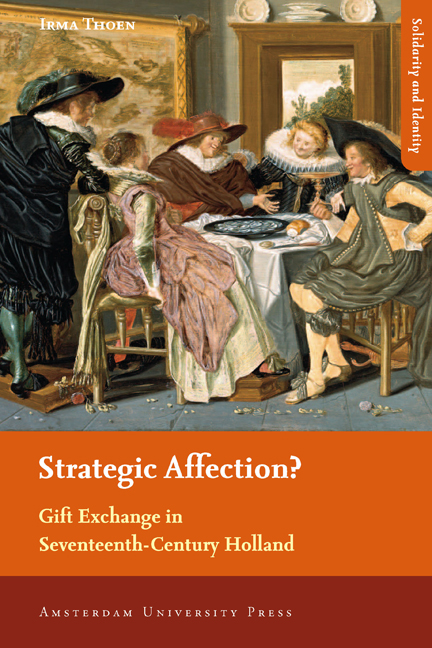Part I - Practices of Gift Exchange
Published online by Cambridge University Press: 14 January 2021
Summary
Daily Hospitality
A sketch of seventeenth-century gift exchange: The case of David Beck
It seems fruitful to start off this research by offering a broad outline of general patterns of gift exchange in seventeenth-century Holland. The sketch that follows here serves as a means of pointing out possible patterns of gift exchange by a seventeenth-century individual. It does not draw on the pretext that this person's gift behaviour is representative for the whole Dutch population of that period. It rather offers an initial opportunity to map what the possible occasions for and networks of exchange were in this period, and what types of gifts were exchanged in these instances. Or to put it differently, it answers the question of “who was giving what to whom and on what occasion”, at least for the case of David Beck in 1624.
Whereas Natalie Davis focuses on four “prescriptions of human exchange”, Christian charity, noble liberality, exchange between friends and generosity among neighbours in sixteenth-century France, this sketch largely confines itself to exchanges within friendship – in the sense of both family and friends – and other individual relations with, for instance, neighbours and professional contacts. This is the result of the choice of sources, as well as the character of Dutch society in that period. A diary, like David Beck’s, does not necessarily include references to charitable offerings, especially since he also kept a cash book which suggests that he might have noted his charitable contributions there. Furthermore, the Dutch Republic is generally seen as a burgerlijke society in which the nobility occupied a weak position. Since David Beck lived in The Hague, he did occasionally come across the nobility such as the stadholder, Prince Maurits of Orange, and the Winter King of Bohemia, who had sought refuge in the Republic, but a burgher like Beck predominantly had contact with other burghers in his personal life. The diary therefore is unlikely to refer to noble liberality. What it does provide, however, is a great number of references to exchanges within his circle of family and friends.
- Type
- Chapter
- Information
- Strategic Affection?Gift Exchange in Seventeenth-Century Holland, pp. 45 - 96Publisher: Amsterdam University PressPrint publication year: 2006



